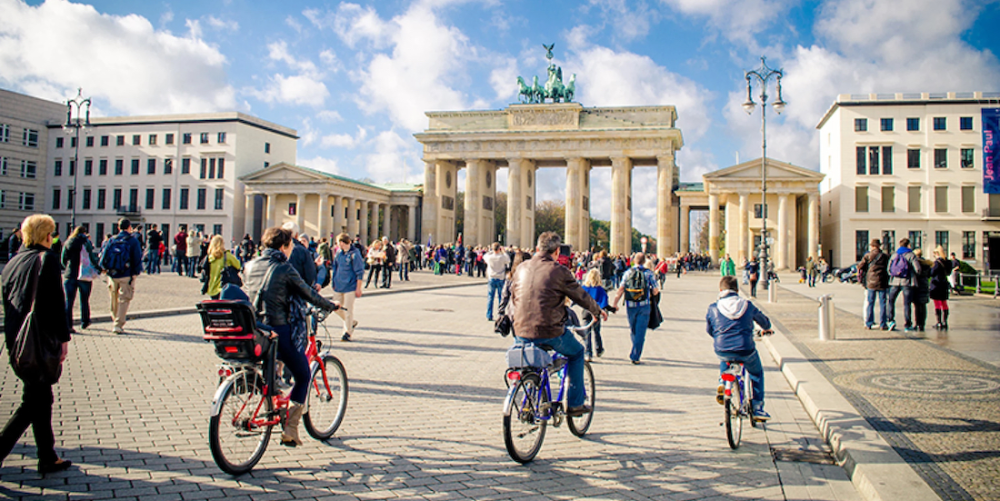
Conservative CDU Party’s Friedrich Merz advocates increased working time to restore economic competitiveness amid productivity concerns
Berlin — Germany’s newly elected conservative Chancellor Friedrich Merz has sparked national debate by calling for Germans to work longer hours, challenging perceptions about the country’s work ethic as Europe’s largest economy grapples with declining competitiveness and sluggish growth.
Germans work an average of 1,349 hours annually,
while Americans an average of 1,811 hours a year
Economic Pressures Drive Policy Shift
Merz, leader of the Christian Democratic Union (CDU), assumes leadership at a critical juncture for Germany’s economy. The nation faces mounting challenges including an aging workforce, rising energy costs following the Ukraine conflict, and increased competition from China and the United States in key manufacturing sectors.
Recent data from the Organization for Economic Co-operation and Development (OECD) shows German workers average 1,349 hours annually, significantly below the OECD average of 1,716 hours. This places Germany among the lowest-working nations globally, trailing countries like France (1,511 hours), United Kingdom (1,532 hours), and United States (1,811 hours).
“We must acknowledge that our current approach to work-life balance may be hindering our economic recovery,” Merz stated during his inaugural address. “Increasing productivity through extended working hours represents a necessary step toward restoring German competitiveness.”

Labor Unions Resist Extended Hours
The proposal faces fierce opposition from German labor unions, historically powerful advocates for worker rights.

Yasmin Fahimi, chairwoman of the German Trade Union Confederation (DGB), argues that longer hours would undermine decades of progress in worker protections.
“Studies consistently demonstrate that productivity correlates more strongly with efficiency than hours worked,” Fahimi said. “Our members have earned their current working conditions through generations of negotiations.”
Germany’s 35-hour work week in manufacturing, negotiated by IG Metall union, has become a symbol of the country’s commitment to worker welfare.
Union representatives warn that extending hours could exacerbate existing labor shortages by reducing job attractiveness to potential workers.
Business Leaders Support Reform
German business associations have largely endorsed Merz’s position, citing competitive disadvantages in global markets. Rainer Dulger, president of the Confederation of German Employers’ Associations (BDA), emphasizes the urgency of structural reforms.
“Our international competitors operate with greater flexibility in working arrangements,” Dulger explained. “German companies require similar adaptability to maintain market position.”
The German Chamber of Commerce and Industry (DIHK) reports that 60% of surveyed businesses support extending working hours, particularly in technology and manufacturing sectors facing intense international competition.
Options for Implementation
Merz’s administration is considering several mechanisms to increase working time. These include extending daily hours from eight to nine, reducing vacation entitlements, or implementing flexible arrangements allowing longer hours during peak periods.
Another proposal involves modifying Germany’s strict Sunday working restrictions, which currently limit retail and service operations. Business leaders argue these regulations handicap the service sector, particularly in tourism and hospitality.
The government also explores incentivizing overtime through tax reductions, making extended hours more attractive to workers while addressing labor union concerns about compensation.
International Comparisons
European neighbors present mixed models for extended working hours. France implemented a 35-hour week but allows numerous exceptions, while Netherlands maintains shorter hours but achieves higher per-capita productivity through technological advancement.
South Korea and Japan demonstrate both benefits and drawbacks of extended working cultures. While these nations maintain high productivity levels, they also experience significant social costs including declining birth rates and increased mental health issues.
Scandinavian countries like Denmark and Sweden achieve high productivity with moderate working hours, suggesting that efficiency improvements might offer alternatives to simply extending time worked.

Public Opinion Divided
Polling data reveals significant generational and regional divisions regarding extended working hours. Younger Germans, particularly those under 35, show greater resistance to longer hours, prioritizing work-life balance over increased earnings.
Conversely, older workers and those in economically struggling regions demonstrate more support for Merz’s proposals, viewing extended hours as necessary for maintaining employment security.
Eastern German states, where unemployment rates remain higher than western regions, show notably stronger support for policies promoting economic growth, even at the cost of reduced leisure time.
The debate reflects broader questions about Germany’s economic future and social priorities as the nation navigates post-pandemic recovery while addressing long-term demographic and competitive challenges.
Audio Summary (75 words)
Germany’s new conservative Chancellor Friedrich Merz proposes extending working hours to boost economic competitiveness. German workers currently average 1,349 hours annually, well below OECD standards. Labor unions strongly oppose the plan, citing worker rights, while business leaders support reforms for global competitiveness. Options include extending daily hours, reducing vacation time, or relaxing Sunday working restrictions. Public opinion remains divided along generational and regional lines, reflecting broader debates about Germany’s economic priorities and social values.
#GermanEconomy #WorkLifeBalance #LaborPolicy
TAGS: germany, work hours, friedrich merz, labor unions, economic policy,
productivity, competitiveness, european economy
Social Media
X (Twitter)
Germany’s New Chancellor Pushes Longer Work Hours. Friedrich Merz advocates extended hours to boost economic competitiveness amid union opposition. #GermanEconomy #WorkPolicy bit.ly/german-work-hours
Bluesky
Germany’s New Chancellor Pushes Longer Work Hours. Chancellor Merz proposes extending working time to restore economic competitiveness, sparking debate between unions and business leaders. #GermanEconomy #LaborPolicy bit.ly/german-work-hours
Germany’s New Chancellor Pushes Longer Work Hours as the nation grapples with economic competitiveness challenges. Chancellor Friedrich Merz proposes extending working hours from current levels well below OECD averages. While business leaders support reforms citing global competition pressures, labor unions resist changes to established work-life balance protections. The debate reflects broader questions about balancing productivity demands with worker welfare in modern economies. This policy shift could influence European labor standards and economic strategies moving forward. #GermanEconomy #LaborPolicy #EuropeanBusiness https://stewardshipreport.org/german-work-hours
Truth Social
Germany’s New Chancellor Pushes Longer Work Hours. Friedrich Merz wants Germans working more to boost economy. Labor unions fighting back hard against changes to current system. Different approach than what we see elsewhere. #GermanEconomy stewardshipreport.org/german-work-hours
Mastodon
Germany’s New Chancellor Pushes Longer Work Hours, sparking national debate about work-life balance versus economic necessity. Chancellor Merz argues extended hours are essential for competitiveness, while unions defend current protections. This represents a significant shift in German labor policy with potential implications across Europe. The discussion touches on fundamental questions about productivity, worker rights, and economic priorities in modern societies. #GermanEconomy #LaborRights stewardshipreport.org/german-work-hours
Germany’s New Chancellor Pushes Longer Work Hours 💼 Chancellor Merz proposes extending working time to boost economic competitiveness. Major debate brewing between unions and business leaders. What’s your take on work-life balance?
#GermanEconomy #WorkLifeBalance #EuropeanPolitics #LaborPolicy #Productivity
Link in bio for full story
Germany’s New Chancellor Pushes Longer Work Hours as Friedrich Merz advocates for extended working time to restore economic competitiveness. The proposal has sparked intense debate between labor unions defending current work-life balance protections and business leaders citing competitive pressures from international markets. With German workers currently averaging significantly fewer hours than OECD standards, this policy shift represents a fundamental change in approach to productivity and worker welfare. #GermanEconomy #LaborPolicy #EuropeanBusiness https://stewardshipreport.org/german-work-hours
Germany’s New Chancellor Pushes Longer Work Hours to boost economic competitiveness. Chancellor Merz proposes extending working time while unions resist changes to current work-life balance protections. German workers currently average 1,349 hours annually versus 1,716 OECD average. Business leaders support reforms citing global competition while unions argue efficiency matters more than hours worked. This debate touches on fundamental questions about productivity, worker rights, and economic priorities.
What’s your take: Should Germany extend working hours for economic competitiveness, or do current policies better balance productivity with worker welfare?
#GermanEconomy #LaborPolicy reddit.com/r/economics/german-work-hours